Boris Skossyreff (original) (raw)
| | Eastern Europe | | | |
| -------------------------------------------------------------------------------------------------------------------------------------------------------------------------------------------------------------------------------------------------------------------------------------------------------------------------------------------------------------------------------------------------------------------------------------------------------------------------------------------------------------------------------------------------------------------------------------------------------------------------------------------------------------------------------------------------------------------------------------------------------------------------------------------------------------------------------------------------------------------------------------------------------------------------------------------------------------------------------------------------------------------------------------------------------------------------------------------------------------------------------------------------------------------------------------------------------------------------------------------------------------------------------------------------------------------------------------------------------------------------------------------------------------------------------------------------------------------------------------------------------------------------------------------------------------------------------------------------------------------------------------------------------------------------------------------------------------------------------------------------------------------------------------------------------------------------------------------------------------------------------------------------------------------------------------------------------------------------------------------------------------------------------------------------------------------------------------------------------------------------------------------------------------------------------------------------------------------------------------------------------------------------------------------------------------------------------------------------------------------------------------------------------------------------------------------------------------------------------------------------------------------------------------------------------------------------------------------------------------------------------------------------------------------------------------------------------------------------------------------------------------------------------------------------------------------------------------------------------------------------------------------------------------------------------------------------------------------------------------------------------------------------------------------------------------------------------------------------------------------------------------------------------------------------------------------------------------------------------------------------------------------------------------------------------------------------------------------------------------------------------------------------------------------------------------------------------------------------------------------------------------------------------------------------------------------------------------------------------------------------------------------------------------------------------------------------------------------------------------------------------------------------------------------------------------------------------------------------------------------------------------------------------------------------------------------------------------------------------------------------------------------------------------------------------------------------------------------------------------------------------------------------------------------------------------------------------------------------------------------------------------------------------------------------------------------------------------------------------------------------------------------------------------------------------------------------------------------------------------------------------------------------------------------------------------------------------------------------------------------------------------------------------------------------------------------------------------------------------------------------------------------------------------------------------------------------------------------------------------------------------------------------------------------------------------------------------------------------------------------------------------------------------------------------------------------------------------------------------------------------------------------------------------------------------- | | ------------------------------------------------------------------------------------------------------------------------------------------------------------------------------------------------------------------------------------------------------------------------------------------------------------------------------------------------------------------------------------------------------------------------------------------------------------------------------------------------------------------------------------------------------------------------------------------------------------------------------------------------------------------------------------------------------------------------------------------------------------------------------------------------------------------------------------------------------------------------------------------------------------------------------------------------------------------------------------------------------------------------------------------------------------------------------------------------------------------------------------------------------------------------------------------------------------------------------------------------------------------------------------------------------------------------------------------------------------------------------------------------------------------------------------------------------------------------------------------------------------------------------------------------------------------------------- | |
| | Boris Skossyreff was born on 12 June 1896 in Vilnius, the capital of Lithuania which, at the time, was within the czarist Russian empire. He died on 27 February 1989 in Boppard, Rhineland Palatinate, in West Germany. [1] He was an apparently White Russian adventurer who attempted to seize power in the European microstate of Andorra in 1934. Russian sources give his name in Cyrillic as Борис Скосырев, for which the modern English transliteration of his name would be Skosyrev. He was also known as Borís Skossyreff Mawrusow, but there are various other spellings and misspellings of his name, including Eskossiref and Deskossyieff. Skossyreff's story The surviving evidence relating to his life story is scattered across a large range of sources - due in part to his moving between many countries. The elements can contradict each other to an extent, partially because he himself gave several versions of events. He claimed to be a member of a minor branch of the Russian nobility, members of which had served in the czarist army, and left Russia, probably in 1917 with the advent of the Russian Revolution. Having been involved with the British army as a liaison officer to Oliver Locker Lampson's RNACD (Lampson commanded Royal Naval Air Service armoured cars during the First World War, and was also an MP), Skossyreff at some point became linked with the Japanese Military Mission to the UK as a translator. The Japanese supported the White Russians during the Russian Civil War. This post ceased with the Armistice of 1918 - index cards in the Foreign Office (FO) records at the National Archives refer to now-weeded files on the Japanese Military Mission's departure, and also to an incident with Boris Skossyreff involving a member of the Japanese mission, but Skossyreff remained in London. The Japanese were more interested in extending their presence in the Pacific/East Asian region than in European affairs. In 1934 he claimed that he had served with the British armoured car unit on the Russian Front during the First World War: the FO file titles mentioned below suggest a slightly different version of events. He acquired a passport from the Russian embassy in August 1918, and opened an account at the Russo-Asiatic Bank the following month. In January 1919 Skossyreff was arrested in London on charges of passing cheques fraudulently to hotels at which he had been staying (having on previous occasions paid his bills), and as an alien of failing to register a change of address (as was then required of foreigners). At his trial he claimed that, after serving in the czarist army, he had in 1917 been imprisoned by the Bolsheviks in the Sts Peter-Paul prison with his father and three uncles: the others had been killed but he had managed to escape aided by a friend. He stated that there were moneys available, but they were presently unavailable, in Russia and elsewhere. He also stated that he had changed his name, for fear of the Bolsheviks. The magistrate stated that he could understand the reason for the deception in Russia, but Bolsheviks were not a problem in the UK. (There was, however, according to The Times of 20 January 1919 page 4, a secret - from the context 'closed' - Bolshevik Congress in London at the time: and, given later events (see below), Boris' fears were not wholly unjustified.) The money required for paying the debts was provided from sources which were not clearly explained. He was later expelled from Britain for further incidents of a similar nature, and returned at a later date, leaving via Newhaven (which was then the major port for ships to Europe). The interwar years In 1925 Boris acquired a Nansen passport, and later a Netherlands passport which he still had in the 1930s. There are claims that he did service for the government and royal family of the Netherlands which resulted in him being given the title of 'Count of Orange'. He may have been involved in spying and related matters with several secret services. Boris' movements between 1919 and the 1930s are somewhat unclear. He was in Majorca by 1930/1931. He stated in an interview in 1934 that he had learnt his Spanish in Colombia, South America, where he seemingly had established an import-export agency. According to an exchange in a 1938 FO file on another topic it was common practice for Europeans going to Latin America, even long-term, to retain their original passports. This would be a reaction to the (actual or perceived) political instability of the region. At some point in the interwar period he converted from Russian Orthodoxy to Protestantism. 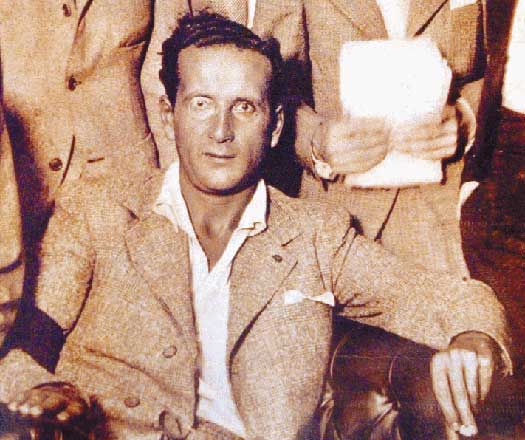 A cropped photograph of Boris Skossyreff in 1934,when he was certainly at his most active, having recently declared himself king of Andorra after providing 'services' to the Netherlands and operating a business in Colombia - his monocle is just about visible | | FOLLOWING PAGES: Rulers of Bulgaria: Khan Kubrat New Monarchy for Serbia Kings of Bosnia Tracing the Croatian Name RULERS OF EUROPE: Andorra Russian Empire [ Lithuania](../KingListsEurope/EasternLithuania.htm#Russian Governors) [ Spain](../KingListsEurope/IberiaSpain.htm#Second Republic) EXTERNAL LINKS: BBC: Your Place & Mine National Archives: Your Archies King of Andorra Publications (in Catalan, English, and Spanish) Boris Skossyreff (in Russian) Boris, King of Andorra (in German)
A cropped photograph of Boris Skossyreff in 1934,when he was certainly at his most active, having recently declared himself king of Andorra after providing 'services' to the Netherlands and operating a business in Colombia - his monocle is just about visible | | FOLLOWING PAGES: Rulers of Bulgaria: Khan Kubrat New Monarchy for Serbia Kings of Bosnia Tracing the Croatian Name RULERS OF EUROPE: Andorra Russian Empire [ Lithuania](../KingListsEurope/EasternLithuania.htm#Russian Governors) [ Spain](../KingListsEurope/IberiaSpain.htm#Second Republic) EXTERNAL LINKS: BBC: Your Place & Mine National Archives: Your Archies King of Andorra Publications (in Catalan, English, and Spanish) Boris Skossyreff (in Russian) Boris, King of Andorra (in German) 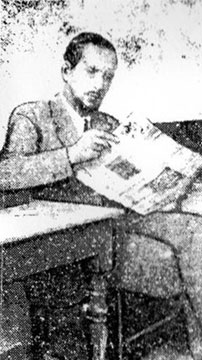 Boris Skossyreff, seated and reading a newspaper on 23 November 1935 [1] The Old Style/Julian Calendar was in use in Russia at the time of Boris' birth in 1896: some records suggest it was 1898 RELATED LINKS: Overview of the Western Front | |
| | His activities and movements during the interwar period may have been influenced in part by what was happening elsewhere in the White Russian movement. In 1930 General Alexander Paul Koutiepoff, head of the Russian royalist groups, disappeared in Paris - he was kidnapped by the GPU (predecessors of the KGB) and executed. Other White Russian leaders suffered similar fates at various points (as did Leon Trotsky, who was also killed on Stalin's orders). On 21 March 1931 he married Marie Luise (Maria Lluïsa) Parat, spelling his name with a single 's' rather than 'ss' and the 'ff' became a 'w.' He stated that he was the son of Michel d'Skosyrew and Elisabeth Mawrusow. Boris had a number of other relationships, including one with a beautiful young Englishwoman named Polly Heard. At some point he became associated with a 'North American millionairess' named Florence Marmon (sometimes misspelt Marzon: there is various information concerning her on the 'Ancestry' website). She was the divorced spouse of Howard Marmon, an American magnate. In 1932 he was living in Palma, Majorca (Spanish Mallorca) with Florence Marmon. There he stated he was a professor of English and physical culture. A decree of expulsion was issued against him. | | | |
| | Andorra in 1933 experienced a period of unrest. The co-princes (the bishop of Urgel in Spain and the president of France) intervened against the Syndics due to their alleged insubordination, calling new elections: there was much resentment at this activity, not least because it occurred in the period in which the Andorran parliament was traditionally not serving (the harvest season, during the summer). A group of French gendarmes was sent to restore order - which caused further resentment - and their departure was eventually negotiated. There were other factors contributing to the unrest. A Spanish power company made arrangements to set up a power station - in return for which they would build roads: a number of the workmen belonged to anarchist or Anarchist-Syndicalist unions and for a period went on strike. Taxes began to be imposed due to the costs of administration and the decline in the supply of concessions by the government. Some websites conflate the events of 1933 and Boris' intervention, when in fact he only obtained Andorran citizenship in December 1933. There were rising tensions in Spain in the lead up to the Spanish Civil War (1936-1939), and in France where right wing groups and monarchist/legitimist parties (there being a partial overlap) were causing disruption: and which resulted in riots in February 1934. After some time Boris presented a plan for administrative reform in Andorra involving the creation of several offices to which he asked to be appointed himself. 1934 There were rumours and remarks by a French press agency that a wealthy resident of Barcelona offered the 'Council General' a sum of money in order to be made king of Andorra (this appeared in several later versions, starting with The Times 13 July 1934 page 14, and also appearing in The Guardian, and then The Manchester Guardian). | |
Boris Skossyreff, seated and reading a newspaper on 23 November 1935 [1] The Old Style/Julian Calendar was in use in Russia at the time of Boris' birth in 1896: some records suggest it was 1898 RELATED LINKS: Overview of the Western Front | |
| | His activities and movements during the interwar period may have been influenced in part by what was happening elsewhere in the White Russian movement. In 1930 General Alexander Paul Koutiepoff, head of the Russian royalist groups, disappeared in Paris - he was kidnapped by the GPU (predecessors of the KGB) and executed. Other White Russian leaders suffered similar fates at various points (as did Leon Trotsky, who was also killed on Stalin's orders). On 21 March 1931 he married Marie Luise (Maria Lluïsa) Parat, spelling his name with a single 's' rather than 'ss' and the 'ff' became a 'w.' He stated that he was the son of Michel d'Skosyrew and Elisabeth Mawrusow. Boris had a number of other relationships, including one with a beautiful young Englishwoman named Polly Heard. At some point he became associated with a 'North American millionairess' named Florence Marmon (sometimes misspelt Marzon: there is various information concerning her on the 'Ancestry' website). She was the divorced spouse of Howard Marmon, an American magnate. In 1932 he was living in Palma, Majorca (Spanish Mallorca) with Florence Marmon. There he stated he was a professor of English and physical culture. A decree of expulsion was issued against him. | | | |
| | Andorra in 1933 experienced a period of unrest. The co-princes (the bishop of Urgel in Spain and the president of France) intervened against the Syndics due to their alleged insubordination, calling new elections: there was much resentment at this activity, not least because it occurred in the period in which the Andorran parliament was traditionally not serving (the harvest season, during the summer). A group of French gendarmes was sent to restore order - which caused further resentment - and their departure was eventually negotiated. There were other factors contributing to the unrest. A Spanish power company made arrangements to set up a power station - in return for which they would build roads: a number of the workmen belonged to anarchist or Anarchist-Syndicalist unions and for a period went on strike. Taxes began to be imposed due to the costs of administration and the decline in the supply of concessions by the government. Some websites conflate the events of 1933 and Boris' intervention, when in fact he only obtained Andorran citizenship in December 1933. There were rising tensions in Spain in the lead up to the Spanish Civil War (1936-1939), and in France where right wing groups and monarchist/legitimist parties (there being a partial overlap) were causing disruption: and which resulted in riots in February 1934. After some time Boris presented a plan for administrative reform in Andorra involving the creation of several offices to which he asked to be appointed himself. 1934 There were rumours and remarks by a French press agency that a wealthy resident of Barcelona offered the 'Council General' a sum of money in order to be made king of Andorra (this appeared in several later versions, starting with The Times 13 July 1934 page 14, and also appearing in The Guardian, and then The Manchester Guardian). | | 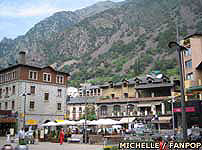 The picturesque Pyrenees principality of Andorra | |
| | An American also attempted to 'buy' the monarchy of Andorra but was rejected: there is some uncertainty as to the exact details and motivation. In May, Boris presented a document outlining reforms and was subsequently expelled from Andorra, having got into trouble. He then went into 'exile' in Seo d'Urgel, taking up residence in the Hotel Mundial. He had various telephone interviews with representatives of the Daily Herald and The Times, and prepared a new offensive. He also made contact with the legitimists in the south of France, his plans promoting Jean Orleans, duc de Guise, the heir to the French throne. On 6 July he proclaimed himself king of Andorra, under the name of Boris I of Andorra. He declared himself 'regent for His Majesty the King of France', Jean d'Orléans, duc de Guise (heir presumptive to the throne of France) who, he declared, was the true inheritor of the titles of count of Foix and count of Berne, they being the sometime co-princes of Andorra. Technically this may be legally correct - but it could also be argued that as both the bishop of Urgel and the Conseil Général des Vallées acquiesced in the assumption of the role by the French president for many years, the existing situation had a certain legality. According to one version, on 8 July the Conseil Général des Vallées ratified this, with a single dissenting voice (out of twenty-four), the monarchy being proclaimed the next day, and a second vote passed 23-1 in favour on 10 July. On 12 July Boris issued a proclamation declaring war on the bishop of Urgel. He also issued an official bulletin, made numerous decrees. The constitution he promoted contained seventeen articles, the longest of them being under thirty words. He also posed for official photographs and wore a monocle and a black armband in commemoration (as seen above) which, he stated, were for the late King Albert. Boris claimed that he made the attempt 'as a joke'. the actual reasons and his financial and other backing are not clear from present records. | |
The picturesque Pyrenees principality of Andorra | |
| | An American also attempted to 'buy' the monarchy of Andorra but was rejected: there is some uncertainty as to the exact details and motivation. In May, Boris presented a document outlining reforms and was subsequently expelled from Andorra, having got into trouble. He then went into 'exile' in Seo d'Urgel, taking up residence in the Hotel Mundial. He had various telephone interviews with representatives of the Daily Herald and The Times, and prepared a new offensive. He also made contact with the legitimists in the south of France, his plans promoting Jean Orleans, duc de Guise, the heir to the French throne. On 6 July he proclaimed himself king of Andorra, under the name of Boris I of Andorra. He declared himself 'regent for His Majesty the King of France', Jean d'Orléans, duc de Guise (heir presumptive to the throne of France) who, he declared, was the true inheritor of the titles of count of Foix and count of Berne, they being the sometime co-princes of Andorra. Technically this may be legally correct - but it could also be argued that as both the bishop of Urgel and the Conseil Général des Vallées acquiesced in the assumption of the role by the French president for many years, the existing situation had a certain legality. According to one version, on 8 July the Conseil Général des Vallées ratified this, with a single dissenting voice (out of twenty-four), the monarchy being proclaimed the next day, and a second vote passed 23-1 in favour on 10 July. On 12 July Boris issued a proclamation declaring war on the bishop of Urgel. He also issued an official bulletin, made numerous decrees. The constitution he promoted contained seventeen articles, the longest of them being under thirty words. He also posed for official photographs and wore a monocle and a black armband in commemoration (as seen above) which, he stated, were for the late King Albert. Boris claimed that he made the attempt 'as a joke'. the actual reasons and his financial and other backing are not clear from present records. | | 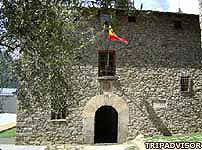 Casa de la Vall, the official residence of 'king' Boris in Andorra | |
| | Boris declared himself to be a White Russian émigré, born in Vilnius. This account was somewhat conflicted by the publication, Spain Week by Week, which reported on 25 July 1934 that he was a thirty-eight year-old Pole who had been resident 'for some years' in Catalonia and Majorca. This may in part be a matter of terminology, given the discontinuities across central and Eastern Europe as a result of the First World War and subsequent events, where geographical areas could pass between several different states, and possess autonomy for various periods. National identities could be fluid and dependant upon context. [2] The account claimed that Skossyreff made his proclamation on 11 July, not the day after, and had declared himself 'Boris I, Prince of the Valleys of Andorra, Count of Orange, and Baron of Skossyreff... sovereign of Andorra and defender of the faith'. After pledging his allegiance to the king of France, it reports that he deposed the Conseil Général des Vallées de Andorra, appointed a provisional government, promulgated a constitution, and issued a court circular before being arrested by the Spaniards. The program which he promoted included the creation of a liberal regime in the chamber, the modernisation of the country, attracting foreign investment - including by declaring it a tax haven - and the establishment of casinos, as in Monaco. A new flag was devised. Skossyreff proclaimed liberty of politics, belief and opinion. He wished to protect those in need, and promote education and sport. The French government, as the co-prince of Andorra, accepted the decision of the Conseil Général of Andorra, but the sole conseiller who had opposed the vote went to Spain, to inform the bishop of Urgel, being the other co-prince of the situation. The bishop disapproved of casinos, considering them links to hell. The Andorran population were not opposed to the establishment of a monarchy. On 14 July, Boris I was deposed by order of the bishop of Urgel and the French president, Albert Lebrun. On 17 July he issued his first 'Court Circular', stating that he had taken the country in the name of the king of France, and that he had five hundred volunteers in Spain and France, none of them being mercenaries. On 20 July, Boris was arrested by the Guarda civil (Spanish police) and taken to Barcelona, and on 23 July to Madrid. Spanish authorities who held him in custody noted he carried a Dutch passport which indicated his date of birth as 12 June 1896. He declared himself to be a White Russian émigré, born in Vilnius.
Casa de la Vall, the official residence of 'king' Boris in Andorra | |
| | Boris declared himself to be a White Russian émigré, born in Vilnius. This account was somewhat conflicted by the publication, Spain Week by Week, which reported on 25 July 1934 that he was a thirty-eight year-old Pole who had been resident 'for some years' in Catalonia and Majorca. This may in part be a matter of terminology, given the discontinuities across central and Eastern Europe as a result of the First World War and subsequent events, where geographical areas could pass between several different states, and possess autonomy for various periods. National identities could be fluid and dependant upon context. [2] The account claimed that Skossyreff made his proclamation on 11 July, not the day after, and had declared himself 'Boris I, Prince of the Valleys of Andorra, Count of Orange, and Baron of Skossyreff... sovereign of Andorra and defender of the faith'. After pledging his allegiance to the king of France, it reports that he deposed the Conseil Général des Vallées de Andorra, appointed a provisional government, promulgated a constitution, and issued a court circular before being arrested by the Spaniards. The program which he promoted included the creation of a liberal regime in the chamber, the modernisation of the country, attracting foreign investment - including by declaring it a tax haven - and the establishment of casinos, as in Monaco. A new flag was devised. Skossyreff proclaimed liberty of politics, belief and opinion. He wished to protect those in need, and promote education and sport. The French government, as the co-prince of Andorra, accepted the decision of the Conseil Général of Andorra, but the sole conseiller who had opposed the vote went to Spain, to inform the bishop of Urgel, being the other co-prince of the situation. The bishop disapproved of casinos, considering them links to hell. The Andorran population were not opposed to the establishment of a monarchy. On 14 July, Boris I was deposed by order of the bishop of Urgel and the French president, Albert Lebrun. On 17 July he issued his first 'Court Circular', stating that he had taken the country in the name of the king of France, and that he had five hundred volunteers in Spain and France, none of them being mercenaries. On 20 July, Boris was arrested by the Guarda civil (Spanish police) and taken to Barcelona, and on 23 July to Madrid. Spanish authorities who held him in custody noted he carried a Dutch passport which indicated his date of birth as 12 June 1896. He declared himself to be a White Russian émigré, born in Vilnius. 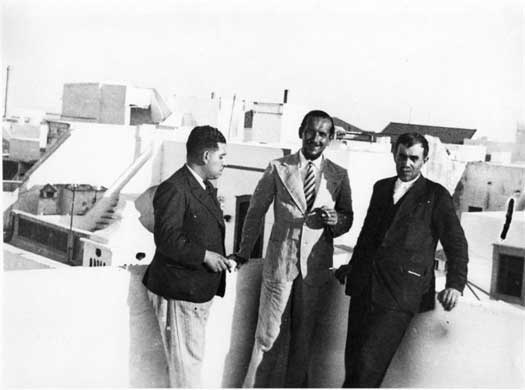 Boris (centre) at Casa Vasco Gaman in 1935, during a period in which his movements are largely unknown but when he appeared at various locations | | [2] There was also the further complication of whether an individual was an ethnic Pole and/or a Polish national, with the same problem existing for Lithuanians and Byelorussians. For centuries prior to the division of Poland, that and Lithuania had existed as a single commonwealth, with former borders being blurred and ethic members of both peoples moving around. Modern Belarus was born out out the easternmost parts of traditional Polish and Lithuanian territories. RELATED LINKS: Belarus Lithuania Poland
Boris (centre) at Casa Vasco Gaman in 1935, during a period in which his movements are largely unknown but when he appeared at various locations | | [2] There was also the further complication of whether an individual was an ethnic Pole and/or a Polish national, with the same problem existing for Lithuanians and Byelorussians. For centuries prior to the division of Poland, that and Lithuania had existed as a single commonwealth, with former borders being blurred and ethic members of both peoples moving around. Modern Belarus was born out out the easternmost parts of traditional Polish and Lithuanian territories. RELATED LINKS: Belarus Lithuania Poland 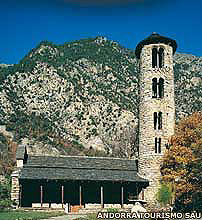 Andorra-la-Vieille, the capital of Andorra | |
| | In November, Boris Skossyreff was expelled from Spain to Portugal. His own lawyer proposed that he be expelled under the law on vagrants, and the magistrates agreed. On reaching the Portuguese border he was arrested for having no passport - he claimed the Spanish had taken his money and documents. He was given a provisional passport on condition that he would not return, going to France from which he was expelled in turn. During his campaign and 'reign' he encouraged photographers for publicity purposes. He had an 'official' photograph taken during his brief 'reign' in which he wore a traditional Andorran birettina, When he was expelled from Spain (for the second time) in November 1934 he was photographed again. After Andorra His movements thereafter are unclear, but there is evidence that he travelled widely, including Lisbon, Tangier and Gibraltar. | | | |
| | In May 1936 he was again in Portugal, with no passport, and was arrested and went to Spain on his release. In 1938 the French authorities allowed him to settle in Aix. In 1939 he was in a French internment camp in Le Vernet, near Toulouse, with Spanish anti-Francoists, Italian anti-fascists, and Central Europeans displaced by the Third Reich's invasion of Central Europe. There were some claims (generally repeated on various websites) that he died in the camp in 1944. However, he did survive, was taken by the Nazis in 1943, and became a 'special officer' (sonderführer) on the Eastern Front. In 1945 he was taken by the Americans, released as not being German or a Nazi, and went to Boppard, Germany, where his wife had settled in 1944. In 1948 he was arrested in Eisenach, Thuringia (then in the Soviet Sector of Germany, afterwards the DDR), tried and sent to Siberia. He returned to Germany in 1956, with the rest of the surviving German POWs, taking up residence again in Boppard: he was granted a small state pension. He made some attempt to sell his memoirs without success, but otherwise lived quietly (given his age and adventures not unsurprisingly). Skossyreff died on 27 February 1989, and was buried in Boppard. His grave gives his birth year as 1900, because he could not prove to the authorities precisely when he had been born. In some Russian-language publications and websites there are somewhat legendary stories which are reported as fact, notably claiming that Boris I ruled Andorra for a number of years until 1941 whereupon he was overthrown by Vichy France. | |
Andorra-la-Vieille, the capital of Andorra | |
| | In November, Boris Skossyreff was expelled from Spain to Portugal. His own lawyer proposed that he be expelled under the law on vagrants, and the magistrates agreed. On reaching the Portuguese border he was arrested for having no passport - he claimed the Spanish had taken his money and documents. He was given a provisional passport on condition that he would not return, going to France from which he was expelled in turn. During his campaign and 'reign' he encouraged photographers for publicity purposes. He had an 'official' photograph taken during his brief 'reign' in which he wore a traditional Andorran birettina, When he was expelled from Spain (for the second time) in November 1934 he was photographed again. After Andorra His movements thereafter are unclear, but there is evidence that he travelled widely, including Lisbon, Tangier and Gibraltar. | | | |
| | In May 1936 he was again in Portugal, with no passport, and was arrested and went to Spain on his release. In 1938 the French authorities allowed him to settle in Aix. In 1939 he was in a French internment camp in Le Vernet, near Toulouse, with Spanish anti-Francoists, Italian anti-fascists, and Central Europeans displaced by the Third Reich's invasion of Central Europe. There were some claims (generally repeated on various websites) that he died in the camp in 1944. However, he did survive, was taken by the Nazis in 1943, and became a 'special officer' (sonderführer) on the Eastern Front. In 1945 he was taken by the Americans, released as not being German or a Nazi, and went to Boppard, Germany, where his wife had settled in 1944. In 1948 he was arrested in Eisenach, Thuringia (then in the Soviet Sector of Germany, afterwards the DDR), tried and sent to Siberia. He returned to Germany in 1956, with the rest of the surviving German POWs, taking up residence again in Boppard: he was granted a small state pension. He made some attempt to sell his memoirs without success, but otherwise lived quietly (given his age and adventures not unsurprisingly). Skossyreff died on 27 February 1989, and was buried in Boppard. His grave gives his birth year as 1900, because he could not prove to the authorities precisely when he had been born. In some Russian-language publications and websites there are somewhat legendary stories which are reported as fact, notably claiming that Boris I ruled Andorra for a number of years until 1941 whereupon he was overthrown by Vichy France. | | 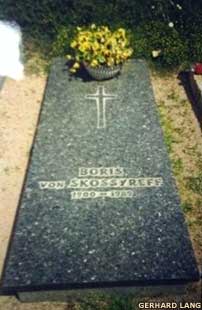 The grave and headstone of Boris Skossyreff, who enjoyed a long and eventful life of ninety-three years | |
| | Main Biographical Sources There will be many more articles in newspapers not accessible online - but, as with other stories, the information tends to be repeated across sources. Articles in The Times 6 January 1919 p 4 - Russian Interpreter's Cheques 13 January 1919 p 2 - Russian Officer's Story. Relatives murdered by Bolshevists 18 January 1919 p 5 - Reticent Russian Officer. A Mysterious Woman Friend 20 January 1919 p 5 - Mysterious Russian's Cheques. Satisfactory explanations 20 January 1919 p 4 - Bolshevists in London. Secret Conference at Memorial Hall 3 March 1934 p 11. - No King for Andorra. Offer from Chicago Declined 13 July 1934 p 14 - A Pretender in Andorra. 'War' declared on Bishop 19 July 1934 p 15 - short note, and p 13 - The Andorran Pretender. Busy week for 'Boris I'. 'Army' of volunteers 21 July 1934 p 12 - Andorran Pretender arrested. Ten days' 'reign' 23 July 1934 p 11 - Andorran Pretender taken to Madrid. 'A militant Prince' 26 July 1934 p 11 - Andorran Pretender in Prison. Disowned by his 'Subjects' 7 November 1934 - The Andorran Pretender 23 November 1934 p 13 - 'Prince Boris of Andorra'. Arrest in Portugal 28 November 1934 p 13 - News in Brief 18 May 1936 p 13 - 'Prince of Andorra' under arrest 9 June 1936 p 13 - Telegrams in Brief New York Times 21 July 1934 p 3 - Boris the First arrested 23 July p 4 - Spain Will Expel 'Boris of Andorra' 24 July - Boris I arrived in Madrid (objected to being taken to Madrid by third class train ticket) 17 July 1936 - The Lima News Wanted: A job for a king. (claimed to be blood-cousin of the Duke of Guise) (1934) "Spain week by week" (pdf). Bulletin of Spanish Studies 11 (44): 209 - 216. doi:10.1080/14753825012331364384. Retrieved on 2007-12-08. There is no information in the local (Westminster) newspaper on Boris' 1919 brush with the law. Books etc Morell Antoni - Boris I, rei d'Andorra, La Magrana, Barcelone (ISBN 84-7410-157-3) - a novel: the author's grandmother had actually met Boris. Play: Beth Escudé, Boris I (el rei d'Andorra) Dokumentationsstelle des Institute fuer Politische Wissenschaft Rechtsextremismusarchive, Schneiderberg 50, 30167 Hannover, Raum 133 (1. Stock) has: i-24584 Zwehl, Ebenhardt von: Der Mannin Jalta: Hitlers geheimer Auftrage an Boris von Skossyreff - Leone/Stamberger See, 1982 The entry for Boris Skossyreff in the Catalan version of Wikipedia has significantly more information on him than the versions in the other languages. Your Place & Mine article on the BBC site (see link in sidebar) suggests that Boris Skossyreff may have served in the Irish units, as an interpreter etc. Boris Skossyreff left a number of traces in government records, several records being noted in the Foreign Office card indexes in The National Archives - as well as a couple of other persons with the surname. Most of the files of this period have been destroyed under standard weeding programs. With thanks to Gerhard Lang for providing additional information for this feature. The National Archives FO card and other indexes 1919: W38 31867 Behaviour of Major Hoshimoto in connection with Boris Skossyreff. FO attitudes towards. Skossyref, Boris de, Baron Services rendered to Allied Embassies in Russia in 1918 N9531/9531/38 Skossyreff W Welfare K562/562/236 (file) 1932 Boris Skossyreff Activities: nationality L 4227/4227/ (file) 1933 Boris de Skossyreff Activities abroad K 13929/1329/241 1934 Skossyreff, Baron, Pretender to the Throne of Andorra, Activities C5139/5139/17 1935 Skossyreff, Baron de, alias Boris Count of Orange alias Rollo, Capt: Portuguese enquiry respecting L1821/1821/405 (file) (There was a (British) Captain Rollo, a member of the peerage, at the time, he and his wife divorced in 1936, the son of this union subsequently inheriting the title.) There are several other persons by the name Skossyreff and variants thereof in computer and other records, at least some of whom are related to Boris. New York Times 30 March 1913 Easily Robbed of Jewels: Russian Woman's Strange Confidence in New Friends in Berlin (About Frau von Skossyreff, wife of the Commandant of Vilna, Russia) The National Archives 1920: 201745/201745/38 Request for assistance by Irene Skossyroff: processing her reparation from Russia to UK 1921 N3890/N4051/1226/38 Skossyreff-Cheshire, FC, Mrs Reparation Expenses of KL 10256/3764/295 L 16191/16191/238 (file) As release of her son, Vadim Skossyreff, from Russia There is also evidence in some French records (available formerly on a French website which is no longer in existence) of Skossyreff relatives - Alexandra Mihailovna (1873-1940) and Michel Skossyreff - her father, her mother being Olga Sakalinska (no dates known for either). Alexandra married twice, having four children by the second marriage, to George Karlovitch Koffriaud. | | | |
| | | | | |
| | Text copyright © Jackie Speel. An original feature for the History Files based on an earlier text for Wikiinfo by the author. | | | |
| | | | | |
The grave and headstone of Boris Skossyreff, who enjoyed a long and eventful life of ninety-three years | |
| | Main Biographical Sources There will be many more articles in newspapers not accessible online - but, as with other stories, the information tends to be repeated across sources. Articles in The Times 6 January 1919 p 4 - Russian Interpreter's Cheques 13 January 1919 p 2 - Russian Officer's Story. Relatives murdered by Bolshevists 18 January 1919 p 5 - Reticent Russian Officer. A Mysterious Woman Friend 20 January 1919 p 5 - Mysterious Russian's Cheques. Satisfactory explanations 20 January 1919 p 4 - Bolshevists in London. Secret Conference at Memorial Hall 3 March 1934 p 11. - No King for Andorra. Offer from Chicago Declined 13 July 1934 p 14 - A Pretender in Andorra. 'War' declared on Bishop 19 July 1934 p 15 - short note, and p 13 - The Andorran Pretender. Busy week for 'Boris I'. 'Army' of volunteers 21 July 1934 p 12 - Andorran Pretender arrested. Ten days' 'reign' 23 July 1934 p 11 - Andorran Pretender taken to Madrid. 'A militant Prince' 26 July 1934 p 11 - Andorran Pretender in Prison. Disowned by his 'Subjects' 7 November 1934 - The Andorran Pretender 23 November 1934 p 13 - 'Prince Boris of Andorra'. Arrest in Portugal 28 November 1934 p 13 - News in Brief 18 May 1936 p 13 - 'Prince of Andorra' under arrest 9 June 1936 p 13 - Telegrams in Brief New York Times 21 July 1934 p 3 - Boris the First arrested 23 July p 4 - Spain Will Expel 'Boris of Andorra' 24 July - Boris I arrived in Madrid (objected to being taken to Madrid by third class train ticket) 17 July 1936 - The Lima News Wanted: A job for a king. (claimed to be blood-cousin of the Duke of Guise) (1934) "Spain week by week" (pdf). Bulletin of Spanish Studies 11 (44): 209 - 216. doi:10.1080/14753825012331364384. Retrieved on 2007-12-08. There is no information in the local (Westminster) newspaper on Boris' 1919 brush with the law. Books etc Morell Antoni - Boris I, rei d'Andorra, La Magrana, Barcelone (ISBN 84-7410-157-3) - a novel: the author's grandmother had actually met Boris. Play: Beth Escudé, Boris I (el rei d'Andorra) Dokumentationsstelle des Institute fuer Politische Wissenschaft Rechtsextremismusarchive, Schneiderberg 50, 30167 Hannover, Raum 133 (1. Stock) has: i-24584 Zwehl, Ebenhardt von: Der Mannin Jalta: Hitlers geheimer Auftrage an Boris von Skossyreff - Leone/Stamberger See, 1982 The entry for Boris Skossyreff in the Catalan version of Wikipedia has significantly more information on him than the versions in the other languages. Your Place & Mine article on the BBC site (see link in sidebar) suggests that Boris Skossyreff may have served in the Irish units, as an interpreter etc. Boris Skossyreff left a number of traces in government records, several records being noted in the Foreign Office card indexes in The National Archives - as well as a couple of other persons with the surname. Most of the files of this period have been destroyed under standard weeding programs. With thanks to Gerhard Lang for providing additional information for this feature. The National Archives FO card and other indexes 1919: W38 31867 Behaviour of Major Hoshimoto in connection with Boris Skossyreff. FO attitudes towards. Skossyref, Boris de, Baron Services rendered to Allied Embassies in Russia in 1918 N9531/9531/38 Skossyreff W Welfare K562/562/236 (file) 1932 Boris Skossyreff Activities: nationality L 4227/4227/ (file) 1933 Boris de Skossyreff Activities abroad K 13929/1329/241 1934 Skossyreff, Baron, Pretender to the Throne of Andorra, Activities C5139/5139/17 1935 Skossyreff, Baron de, alias Boris Count of Orange alias Rollo, Capt: Portuguese enquiry respecting L1821/1821/405 (file) (There was a (British) Captain Rollo, a member of the peerage, at the time, he and his wife divorced in 1936, the son of this union subsequently inheriting the title.) There are several other persons by the name Skossyreff and variants thereof in computer and other records, at least some of whom are related to Boris. New York Times 30 March 1913 Easily Robbed of Jewels: Russian Woman's Strange Confidence in New Friends in Berlin (About Frau von Skossyreff, wife of the Commandant of Vilna, Russia) The National Archives 1920: 201745/201745/38 Request for assistance by Irene Skossyroff: processing her reparation from Russia to UK 1921 N3890/N4051/1226/38 Skossyreff-Cheshire, FC, Mrs Reparation Expenses of KL 10256/3764/295 L 16191/16191/238 (file) As release of her son, Vadim Skossyreff, from Russia There is also evidence in some French records (available formerly on a French website which is no longer in existence) of Skossyreff relatives - Alexandra Mihailovna (1873-1940) and Michel Skossyreff - her father, her mother being Olga Sakalinska (no dates known for either). Alexandra married twice, having four children by the second marriage, to George Karlovitch Koffriaud. | | | |
| | | | | |
| | Text copyright © Jackie Speel. An original feature for the History Files based on an earlier text for Wikiinfo by the author. | | | |
| | | | | |